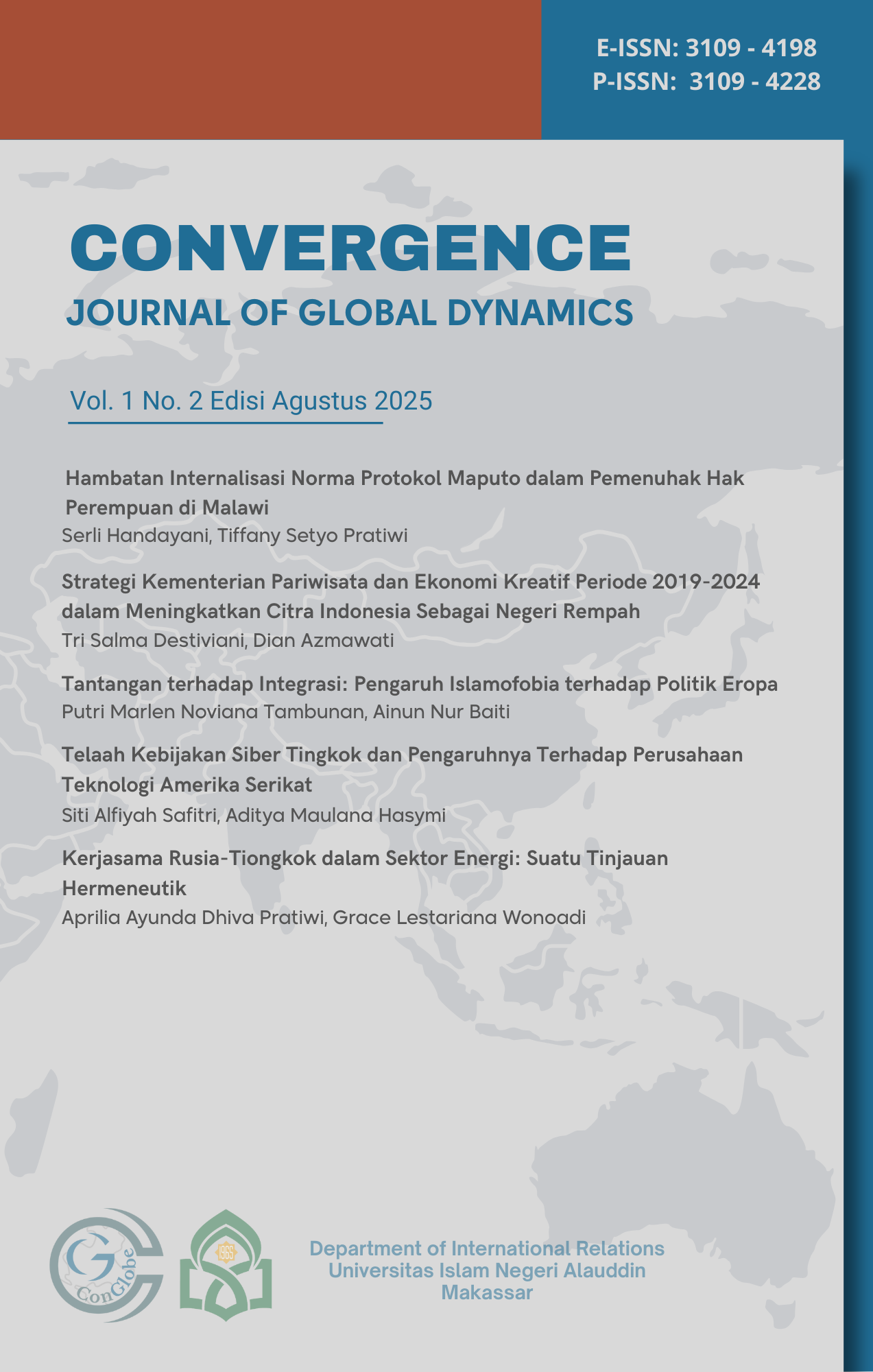TELAAH KEBIJAKAN SIBER TIONGKOK DAN PENGARUHNYA TERHADAP PERUSAHAAN TEKNOLOGI AMERIKA SERIKAT
Keywords:
Cyberspace Administration of China, Kedaulatan Digital, Perusahaan Teknologi Amerika Serikat, Cyberpower, Stabilitas PolitikAbstract
This research explores the establishment of the Cyberspace Administration of China (CAC) as a strategic response by the Chinese government to counter the influence of American technology companies in the digital sphere. Employing a descriptive qualitative method and grounded in Digital Sovereignty and Cyberpower theories, this study analyzes the role of CAC as a central instrument in managing digital governance and national information control. Findings reveal that CAC serves not only as an administrative authority but also as a political apparatus designed to ensure ideological conformity, protect national data, and promote digital independence. Through strict regulations and censorship, CAC imposes operational limitations on U.S.-based tech firms like Google, Facebook, Apple, and Microsoft. These actions align with China’s broader ambition to establish cyber sovereignty, safeguard national security, and ensure domestic political stability. By analyzing CAC’s institutional design and policy implementation, this research contributes to understanding how authoritarian states leverage digital governance to challenge Western technological dominance and reshape global internet governance norms.
References
Allison, G. (2018). The Great Tech Rivalry: China vs the U.S. Harvard Kennedy School Belfer Centre.
Attrill, N., & Fritz, A. (2021). China's Cyber Vision: How the Cyberspace Administration of China is Building a New Consensus on Global Internet Governance. Australian Strategic Policy Institute.
Brady, A. M. (2009). Marketing dictatorship: Propaganda and thought work in contemporary China. Rowman & Littlefield Publishers.
Buzan, B. (1983). People, States and Fear: The National Security Problem in International Relations. Brighton: Wheatsheaf Books.
Buzan, B. (1991). People, States and Fear: An Agenda for International Security Studies in the Post-Cold War Era (2nd ed.). London: Harvester Wheatsheaf.
Buzan, B., & Hansen, L. (2009). The Evolution of International Security Studies. Cambridge University Press.
Chander, A., & Sun, H. (Eds.). (2023). Data Sovereignty: From the Digital Silk Road to the Return of the State. Oxford University Press.
Chen, Y. (2025). The Accuracy and Biases of AI-Based Internet Censorship in China. Journal of Research in Social Science and Humanities, 4(2), 27–36.
Chertoff, M., & Simon, T. (2021). The Impact of Chinese Cyber Policies on Global Norms. Council on Foreign Relations.
Clementi, D. (2024). Between Digital Surveillance and Individual Protection: A Juridical and Comparative History of the Cyberspace Administration of China. Rivista di Digital Politics, 4(2), 343–370.
Clementi, E. (2023). China’s Digital Leviathan: Surveillance, Sovereignty, and the Cyberspace Administration of China. Journal of East Asian Studies, 25(2), 133–157.
Creemers, R. (2017). Cyber China: Upgrading Propaganda, Public Opinion Work and Social Management for the Twenty-First Century. Journal of Contemporary China, 26(103), 85-100.
Creemers, R. (2018). China’s Social Credit System: An Evolving Practice of Control. SSRN Electronic Journal.
Creemers, R. (2020). China’s Conception of Cyber Sovereignty. In Governing Cyberspace: Behaviour, Power and Diplomacy (pp. 107-145).
Creemers, R. (2022). China’s Emerging Data Protection Framework. Journal of Cybersecurity, 8(1), tyac011.
Deibert, R.J. (2013). Black Code: Inside the Battle for Cyberspace. Toronto: Signal Books.
Deibert, R.J. (2020). Reset: Reclaiming the Internet for Civil Society. Toronto: House of Anansi Press.
Fang, B. (2018). Digital Sovereignty: The Role of the Cyberspace Administration of China in Internet Regulation and Control. International Journal of Cyber Policy and Governance, 5(1), 1–16.
Feldstein, S. (2019). The Global Expansion of AI Surveillance. Carnegie Endowment for International Peace.
Feldstein, S. (2021). The Rise of Digital Repression: How Technology Is Reshaping Power, Politics, and Resistance. Oxford University Press.
Gao, X. (2022). An Attractive Alternative? China’s Approach to Cyber Governance and Its Implications for the Western Model. The International Spectator, 57(3), 15–30.
Hong, S. H. (2020). Technologies of Speculation: The Limits of Knowledge in a Data-Driven Society. In Technologies of Speculation. New York University Press.
Hong, Y., & Goodnight, G. T. (2022). How to Think About Cyber Sovereignty: The Case of China. In China’s Globalizing Internet (pp. 7-25). Routledge.
Hong, Y., & Goodnight, G.T. (2022). Authoritarian Information Order: The Digital Construction of Cyber Sovereignty in China. Communication and the Public, 7(1), 23–39.
Hough, P. (2008). Understanding Global Security. London: Routledge.
Jia, M. (2024). Authoritarian Privacy. The University of Chicago Law Review, 91(3), 733–810.
Jiang, Y. (2012). Cyber-Nationalism in China: Challenging Western Media Portrayals of Internet Censorship in China. University of Adelaide Press.
Kello, L. (2017). The Virtual Weapon and International Order. Yale University Press.
King, G., Pan, J., & Roberts, M. E. (2017). How the Chinese Government Fabricates Social Media Posts for Strategic Distraction, Not Engaged Argument. American Political Science Review, 111(3), 484–501.
Kokas, A. (2022). Trafficking Data: How China Is Winning the Battle for Digital Sovereignty.
Kokas, A. (2023). Trafficking Data: How China is Winning the Battle for Digital Sovereignty. Oxford University Press.
Lamont, C. (2021). Research Methods in International Relations.
Li, X. (2023). Data Politics in China: The Role of CAC in Managing Digital Society. Asian Journal of Communication, 33(1), 43–60.
Li, Y. (2023). Cyberspace and Social Governance: The Role of the Cyberspace Administration Office. In Handbook on Local Governance in China (pp. 224-243). Edward Elgar Publishing.
MacKinnon, R. (2009). China’s Censorship 2.0: How Companies Censor Bloggers. First Monday.
Miao, W., & Lei, W. (2016). Policy Review: The Cyberspace Administration of China. Global Media and Communication, 12(3), 337-340.
Miao, W., Zhu, H., & Chen, Z. (2018). Who's in Charge of Regulating the Internet in China: The History and Evolution of China's Internet Regulatory Agencies. China Media Research, 14(3).
Moore, G. J. (2023). Huawei, Cyber-Sovereignty and Liberal Norms: China’s Challenge to the West/Democracies. Journal of Chinese Political Science, 28(1), 151-167.
Mozur, P., & Zhong, R. (2021). Apple Bows to Beijing’s Rules, and iCloud Data Is Now Controlled by China. The New York Times.
Mueller, M. (2010). Networks and States: The Global Politics of Internet Governance. Cambridge, MA: MIT Press.
Nye, J. S. (2010). Cyberpower. Cambridge, MA: Harvard University Belfer Center for Science and International Affairs.
Portrait, A. (2023). The Cyberspace Administration of China. In The Emergence of China’s Smart State (pp. 9).
Qi, A., Shao, G., & Zheng, W. (2018). Assessing China's Cybersecurity Law. Computer Law & Security Review, 34(6), 1342–1354.
Qiang, X. (2019). The Road to Digital Unfreedom: President Xi’s Surveillance State. Journal of Democracy, 30(1), 53–67.
Roberts, M. (2018). Censored: Distraction and Diversion Inside China's Great Firewall. Princeton University Press.
Schaefer, K. (2021). China’s Techno-Authoritarianism: How the CAC Shapes the Future of Data Governance. Trivium China Briefing Report.
Schia, N. N., & Gjesvik, L. (2022). China's Cyber Sovereignty. Norwegian Institute for International Affairs (NUPI).
Segal, A. (2016). The Hacked World Order: How Nations Fight, Trade, Maneuver, and Manipulate in the Digital Age. Hachette UK.
Segal, A. (2018). When China Rules the Web: Technology in Service of the State. Foreign Affairs, 97(5), 10–18.
Segal, A. (2020). China’s Vision for Cyber Sovereignty and the Global Governance of Cyberspace. Current History, 119(816), 9–14.
Wang, A. (2020). Cyber Sovereignty at Its Boldest: A Chinese Perspective. Ohio St. Tech. LJ, 16, 395.
Wang, Q., & Luo, X. (2021). China’s Cyberspace Administration and the New Era of Internet Governance. Journal of Contemporary Asia, 51(4), 567–583.
Xu, B., & Albert, E. (2014). Media Censorship in China. Council on Foreign Relations, 25(1), 243–249.
Yang, G. (2009). The Power of the Internet in China: Citizen Activism Online. Columbia University Press.
Zeng, J., Stevens, S., & Chen, X. (2017). China’s Solution to Global Cyber Governance: Unpacking the Domestic Discourse of “Internet Sovereignty”. Politics & Policy, 45(3), 432–464.
Zeng, J., Stevens, T., & Chen, Y. (2017). China’s Solution to Global Cyber Governance: Unpacking the Domestic Discourse of Internet Sovereignty. Politics & Policy, 45(3), 432–464.
Zhang, A., & Gilli, A. (2021). Digital Authoritarianism Goes Global: China’s Cyber Sovereignty Doctrine and Its International Influence. Strategic Studies Quarterly, 15(2), 40–63.
Zhang, Y., & Gilley, B. (2021). Authoritarian Resilience in the Digital Era: Surveillance, Propaganda, and the Chinese Communist Party. Journal of Democracy, 32(2), 59–73.
Zhao, Y. (2008). Communication in China: Political Economy, Power, and Conflict. Lanham, MD: Rowman & Littlefield Publishers.
Zheng, Y. (2007). Technological Empowerment: The Internet, State, and Society in China. Stanford University Press.




